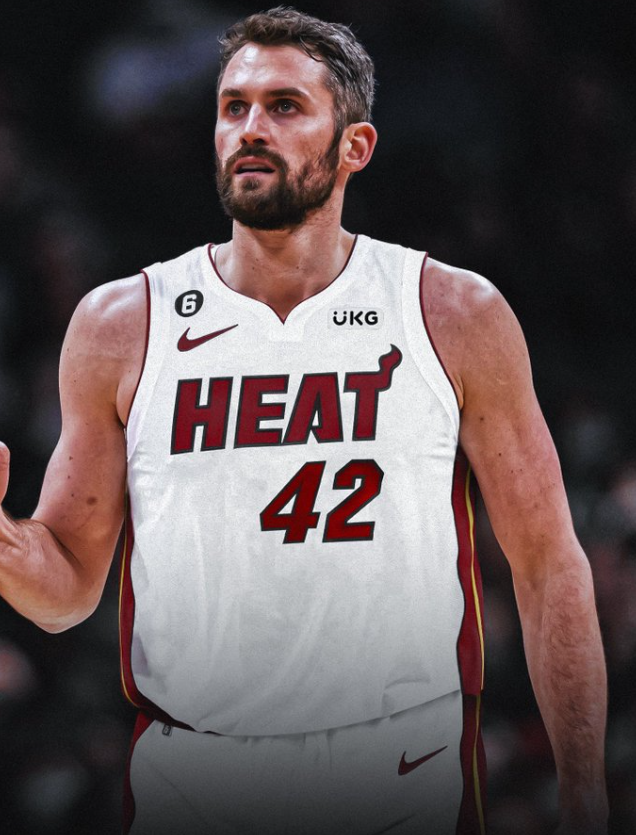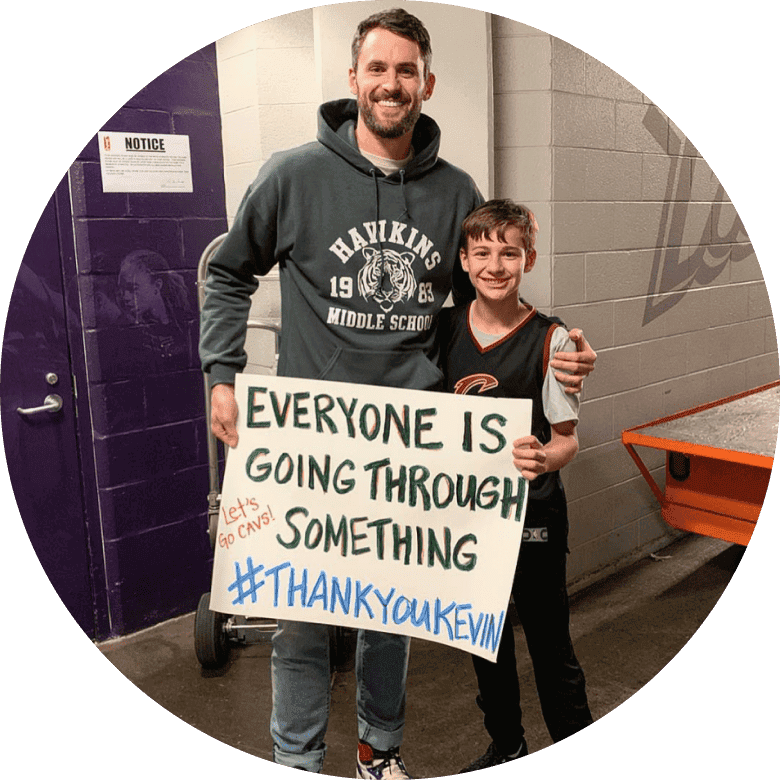Panic attack didn't sideline Heat's Kevin Love, instead he advocates for mental health
- Oops!Something went wrong.Please try again later.
When veteran power forward Kevin Love joined the Miami Heat late last season, the club acquired more than just a former All-Star and NBA champion.
They got one of the sports world’s pioneers in normalizing discussions about anxiety, depression and overall mental health.
That’s because in March 2018, Love — age 29 at the time and a five-time All-Star playing for the Cleveland Cavaliers — penned a moving first-person essay in The Players’ Tribune detailing how he’d recently suffered the first full-blown panic attack of his life.

“It came out of nowhere. I’d never had one before. I didn’t even know if they were real,” he wrote. “But it was real — as real as a broken hand or a sprained ankle. Since that day, almost everything about the way I think about my mental health has changed.”
Scary mid-game episode
As he explained, it happened during the middle of a game.
“I knew something was wrong almost right after tip-off. “I was winded within the first few possessions. That was strange ... After halftime, it all hit the fan,” he wrote.
For anyone who has ever suffered a panic attack, what Love described next will sound all-too familiar: “When I got to the bench, I felt my heart racing faster than usual. Then I was having trouble catching my breath. It’s hard to describe, but everything was spinning, like my brain was trying to climb out of my head. The air felt thick and heavy. My mouth was like chalk. I remember our assistant coach yelling something. I nodded, but I didn’t hear much of what he said. By that point, I was freaking out. When I got up to walk out of the huddle, I knew I couldn’t reenter the game — like, literally couldn’t do it physically.”
He felt as though his body was telling him “you’re about to die.”
Recognizing their star was not himself, the Cavaliers immediately took Love back to the locker room and then accompanied him to Cleveland Clinic for a full battery of tests.
“The next part was a blur,” he recalled.
Understanding his feelings after it happened
While panic attacks like Love's fall under the umbrella of mental health, the effects, as he described, are most certainly physical as well. Because Love was with medical professionals when his happened, he was able to get immediate feedback on what was happening. However, some panic-attack sufferers may experience what they misidentify as a heart attack, while others even find themselves physically paralyzed ― albeit temporarily.
Fortunately for Love, all his physical tests came back negative and he returned to the court two days later and played at his usual high level.
And while he enjoyed being back on the court he “distinctly remembered being more relieved than anything that nobody had found out why I had left the game” — a feeling that led him to explore “why was I so concerned with people finding out?”
He believes his feelings stemmed from the societal stigma of revealing that you’re struggling with emotional issues and need help.
“I didn’t want people to perceive me as somehow less reliable as a teammate, and it all went back to the playbook I’d learned growing up,” he wrote.
But the episode convinced him that he needed the kind of help and support that he’d “scoffed at” just a few years earlier: He began meeting regularly with a trained mental-health therapist, and the sessions helped him deal with his struggles
Athletes talking about mental-health struggles
Love said at the time that the reason he went public was that, just a week earlier, another NBA All-Star, DeMar DeRozan, had gone public about his struggles with depression.
He noted it “really makes you think about how we are all walking around with experiences and struggles — all kinds of things — and we sometimes think we’re the only ones going through them.”
Two years later, at the height of the pandemic lockdown in September 2020, Love penned a follow-up The Players’ Tribune essay. He revealed that he was still in therapy and on medication but noted that his approach wasn’t necessarily for everyone.
And that, even with taking an active approach to maintaining his mental health, he still struggled often.
But he did offer this piece of advice for anyone who was struggling: “All I can say to you is this: “Talk to somebody. You would be amazed at how freeing it is just to talk to somebody, and tell them the truth about what you’re going through.”
To further his advocacy, he also founded the nonprofit Kevin Love Fund whose mission is “to inspire people to live their healthiest lives while providing tools for both mental and physical health.”

The organization does this through a combination of education, research, grantmaking, and public awareness initiatives with the goal of ensuring that people who are suffering have the support needed to thrive.
Using nootropics
In the past year, Love has also become a brand ambassador for the nootropics manufacturer Thesis.
According to the National Institutes of Health, nootropics (aka “smart drugs”) “are a diverse group of medicinal substances whose action improves human thinking, learning, and memory, especially in cases where these functions are impaired.”
Proponents of nootropics take them to enhance cognitive function. Some nootropics are prescription medications designed to mitigate certain physical conditions (such as ADHD), while other over-the-counter ones, such as caffeine or creatine, are purported to generally improve mental alertness.
Thesis, the company Love is involved with, is considered a nutritional supplement (and thus the product is not regulated by the FDA and can't make any definitive claims or promises about its efficacy). Its website says that because “nootropics aren’t one size fits all” it works with its customers to “formulate potent nutrient compounds to enhance mental performance and make personalized recommendations based on your goals and unique brain chemistry.”
On the Thesis website Love is quoted as saying “with a busy life on and off the court, Thesis gives me energy and focus to get through the longest days and keep me sharp.”
Regardless of how you deal with your own mental health struggles, Love’s primary message comes at the conclusion of his second The Players’ Tribune essay: “If you’re struggling right now, I can’t tell you that this is going to be easy. But I can tell you that it does get better. And I can tell you that you are definitely not alone.”
This article originally appeared on Palm Beach Post: Miami Heat NBA star Kevin Love's mental health talk helping others

